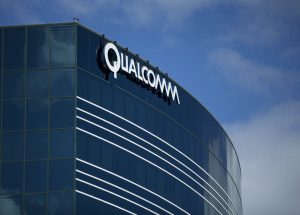 Qualcomm Inc. (NASDAQ:QCOM) has been given a NT$23.4 billion ($774.14 million) antitrust fine in Taiwan. The Taiwan Fair Trade Commission said it levied the fine on Qualcomm for anti-trust violations of its chip technology. The Taiwanese regulator found the company has been violating antitrust rules for at least 7 years and that Qualcomm collected NT$400 billion in licensing fees from local companies during that time.
Qualcomm Inc. (NASDAQ:QCOM) has been given a NT$23.4 billion ($774.14 million) antitrust fine in Taiwan. The Taiwan Fair Trade Commission said it levied the fine on Qualcomm for anti-trust violations of its chip technology. The Taiwanese regulator found the company has been violating antitrust rules for at least 7 years and that Qualcomm collected NT$400 billion in licensing fees from local companies during that time.
In a statement, the Fair Trade Commission said Qualcomm held a monopoly over the chip market for several modem technologies and refused to license its technology to other players in the industry. The Commission said, “Qualcomm holds big number of standard essential patents in CDMA, WCDMA and LTE segments and is the dominant provider of CDMA, WCDMA and LTE baseband chips. It abused its advantage in mobile communication standards, refused to license necessary patents.”
Qualcomm will be required to remove previously signed deals that force competitors to provide price, customer names, shipment, model name and other sensitive information as well as other clauses in its agreements. Qualcomm will also be required to submit a progress report on the matter to the Commission every six months. The Commission’s formal decision is expected in the next several weeks.
The fine from Taiwan is just the latest action in a years-long streak of regulatory setbacks to its business model. Qualcomm’s business model involves selling chips and licensing patents related to how those chips are put into a phone to provide wireless data connectivity. The main allegation in the legal attacks is that Qualcomm uses its dominant position in the market for modem chips to charge unfair royalty rates for its patents.
Chinese regulators fined the company $975 million over the matter in 2015. Korean regulators fined Qualcomm $854 million last December for violating its competition laws. It’s practices are being probed in, Japan, the European Union, and elsewhere. The company is also fighting U.S. regulators and iPhone maker Apple Inc. in court over many of the same legal issues.
The U.S. Federal Trade Commission is suing Qualcomm over its licensing practices. Apple is waging a global legal battle over Qualcomm’s practice of charging a percentage of the total price of Apple devices as a licensing fee for its patents. Qualcomm has since asked the U.S. International Trade Commission to ban imports of some iPhones and filed a separate civil lawsuit accusing Apple of infringing on the patents at issue.
